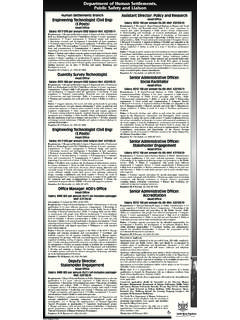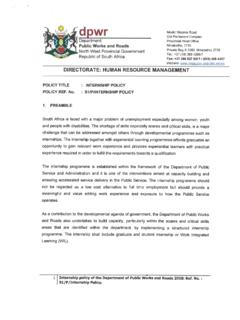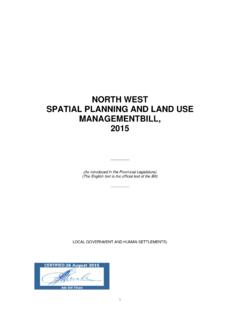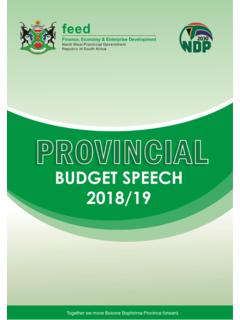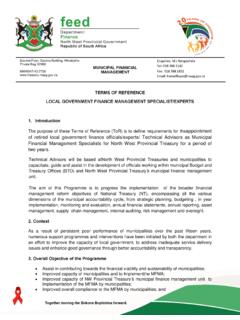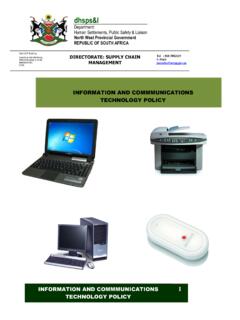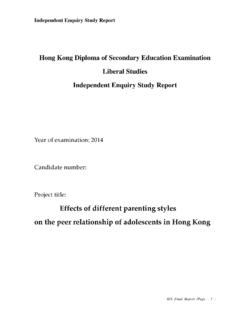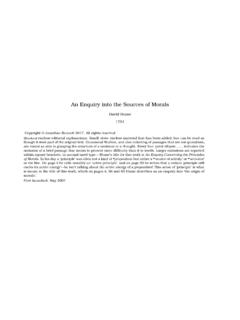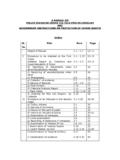Transcription of DISCIPLINARY ENQUIRY - North West
1 DISCIPLINARY ENQUIRY HELD AT: DEPARTMENT OF PUBLIC WORKS Roads and Transport Offices Mafikeng, Northwest Province. THE DEPARTMENT OF PUBLIC WORKS, ROADS AND TRANSPORT ( the Department ) Employer and MR. EDDIE THEBE Employee SANCTION 1. In terms of the DISCIPLINARY Code and Procedures contained in Resolution Number 2 of 1999 which is a collective agreement between the employer and employees, where an employee is found guilty by a DISCIPLINARY ENQUIRY , the DISCIPLINARY processes should be a two phased ENQUIRY . The first ENQUIRY is the establishment of misconduct which in this particular matter has already been found to exist. The next phase is to determine the appropriate penalty for the misconduct in respect of which the employee has been found guilty. 2. In general, the intended purpose and scope of the DISCIPLINARY code and procedures is to support constructive labour relations in the public service, to ensure that managers and employees 2 share a common understanding of misconduct and discipline, to promote acceptable conduct or to avert and correct unacceptable conduct.
2 Some of the principles upon which the code and procedure is based is that discipline which is a management function is a corrective measure and not a punitive one, and that it must be applied in a prompt, fair, consistent and progressive manner. In the event the alleged misconduct justifies a more serious form of DISCIPLINARY action than provided in some parts of the DISCIPLINARY code, the employer is permitted to initiate a DISCIPLINARY ENQUIRY . Accordingly, it is only in respect of serious misconducts that the employer may, in terms of the code, convene a DISCIPLINARY ENQUIRY to deal with the alleged type of 3. In terms of Schedule 8, Item 3(2) and (3) the concept of corrective or progressive discipline is encouraged and in terms of which discipline is taken as a means for employees to know and understand what standards are required of them. All efforts should thus be made to correct employees behaviour through a system of graduated DISCIPLINARY measures such as counselling and warnings.
3 Dismissal should be reserved for cases of serious misconduct or repeated 1 See Resolution No. 2 of 1999 clause 6 on serious misconduct. 2 See Schedule 8, Code of Good Practice Dismissal, Item 3(2) and (3). 3 4. In brief, the employee representative addressed me at length on the need, in the circumstances of this case, to adopt a similar approach that all efforts should be made to correct Mr Thebe s behaviour through a system of graduated DISCIPLINARY measures in that dismissal is not an appropriate sanction. He accordingly called upon me to impose any of the following sanctions: Any manner of a warning which may also be a final warning; Suspension without pay for not longer than three (3) months; or A transfer to another department so that he could plough back the investments that the Department had made on him in funding for his education until at Masters level.
4 5. The submissions were largely based on Mr Thebe s personal circumstances, clean DISCIPLINARY record and the fact that he had not been found guilty of fraud or corruption for his personal gain. Whilst on the other hand the Department urged me to impose a sanction of dismissal. 4 6. Mr Thebe submitted that the test on mitigating factors is whether the facts taken individually or cumulatively whether he would repeat the same offence in respect of which he has been found guilty. For this reason, he referred me to the following facts, his long service, personal circumstances that he is remorseful and his commitment to the workplace. He submitted that long service is an important or weighty consideration, depending on the circumstances to determine whether he will repeat the offence or not. 7. With regard to his long service, he commenced working for the Department in its Traffic Section on 27 January 1981.
5 Since then, the Department has been and still is the only employer from a very young age, whilst he was in his twenty s. In 1984 he was promoted to a Chief Traffic Officer and in 1988 he was transferred to the Transport Section as a Road Safety Liaison Officer. In 1995 he became a Deputy Director for Road Safety. In 2005 he became a Director for Road Safety. In 2006 he was promoted to a Director for Roads. In 2007 he became an Acting Chief Director for Roads Management and in 2008 he became Chief Director, Road Management which is the position he currently occupies. He has accordingly over 22 years of service within the Department of Transport. 5 8. During this period he was never charged nor found guilty of any misconduct within the workplace accordingly he has a clean DISCIPLINARY record. It was contended that such an impressive record is a weighty factor to be considered in the determination of an appropriate sanction and it is also an indicator whether he will commit the same offence or not.
6 9. It was submitted on his behalf that he has no propensity to commit the same or similar transgressions and since he now knows of the offences or conducts constituting offences, various safeguards can be implemented to avoid such from him happening again. Mr Thebe accordingly tendered his commitment to all the workplace values now that it has become clear what the complaints are against him. He is fifty years old, close to retirement and committed to staying with the Department until his retirement. From the time he commenced working for the Department until now, the Department had invested extensively in him through his education which was fully paid for by the Department. 10. He sketched out his personal circumstances in the following manner; that he is married with four children, three of whom are at university and one still at primary school level. All of them are staying and dependent on him, including his wife who is unemployed.
7 If he is dismissed, it will be difficult for him at 6 his age to find another job in the public service. If the Department dismisses him, it would also lose an investment it had made in his education. Through the Department s financial assistance, he obtained his matric in 1987, obtained a Diploma in Public Relations in 1990, Bachelor of Arts or BA in 1998, Honours Degree in Communication in 1999 and a Masters Degree in Public Relations Management in 2005. The position he currently occupies or had occupied in the Department are in line with his qualifications and is accordingly prepared to plough back to the Department. Mr Thebe is now genuinely remorseful and would not have wished that such a situation occur on the Department and himself. He is full of regret that he now finds himself in this situation after many years of reliable service to the Department. 11. He further submitted that, despite him having been found guilty of misconduct, he can still be trusted as he has over the last 22 years honestly served the interests of the Department and given his personal circumstances he is an appropriate case for corrective or progressive discipline as a means to correct his behaviour or conduct.
8 The sanction to be imposed upon him should not only be punitive in nature, but corrective as the code of good practice and guidelines contemplate. His personal circumstances need not be specifically used to send a message 7 to everyone because internal matters are not intended to be precedent setting. 12. Whilst on the other hand the employer submitted that it is important to understand that his personal circumstances should be weighed with the level of education he had received, especially that he has a Masters Degree. Mr Thebe is a person of above average intellectual capacity. That he spent his entire youth working for the government means that he is one of those employees who migrated from the old administration of the Bophuthatswana Government to the new administration. From the sketched out personal circumstances, it shows that he has an impressive developmental record within the Department.
9 However for a person of his level, he should have cherished what he had achieved for himself and the family over the years. 13. The Department further submitted that the charges against him related to a proper utilisation of public funds which is a serious charge. The stance that he took against these charges was that he did not know of the processes sketched out and basically denied any wrongdoing. This is despite the fact that he is a person who worked his way up within the Department from a very junior level. By virtue of this fact, he knew very well its processes and it could thus not be correct for him to have stated that he was not aware of these processes he was charged of 8 having contravened. From the stance which he had taken it shows that he is a person who cannot be rehabilitated nor can he be transferred to another department because the department from which he is to be transferred cannot trust him.
10 If he is transferred to another department, that cannot be a lesson enough for others within the Department not to contemplate committing the same offences. The offences in respect of which he was charged and found guilty had resulted in the Department losing a lot of money. Therefore, any sanction short of a dismissal would not be a deterrent to other public service employees within the Department. The fact that he was called upon to answer to these charges in a DISCIPLINARY hearing, it meant that the charges were very serious against him. 14. Accordingly, the Department or employer urged me to impose a sanction of a dismissal. That he is a breadwinner should not be a determining factor for a person of his intellectual capability. He occupied a very senior position in government where he was entrusted with the duty to guard public funds and to ensure that service delivery is carried out. He failed to carry out such functions in ignorance of the fact that he is a breadwinner.

